
New Books in German Autumn 2023
New Books in German promotes German-language literature for translation into English. We feature recommendations of the best new fiction and non-fiction titles from Austria, Germany, and Switzerland. Books which we recommend benefit from guaranteed financial support for their translation into English.
Great stories and ideas travel and translate well. New Books in German provides trusted, expert, independent recommendations of excellent German-language books that will suit anglophone readers. Twice a year we convene expert juries in the UK and US to select books submitted to us by German-language publishers.
Contact: Sarah Hemens
These are the recommendations for Autumn 2023
Single title

Laura Freudenthaler’s timely literary novel is rooted in the present-day climate crisis. Arson chronicles the nightmarish scenarios in the daily life of...
Laura Freudenthaler’s timely literary novel is rooted in the present-day climate crisis. Arson chronicles the nightmarish scenarios in the daily life of an unnamed narrator as the climate crisis ravages her life, relationships, sleep, and ability to relate to the people around her.
The opening sections of the novel convey the protagonist’s disorientation as she repeatedly wakes up from periods of disordered sleep. The story transitions from her internal world – her thoughts, bodily sensations, dreams and nightmares, and the spare rooms she inhabits – to the external world. The woman moves repeatedly, seeking refuge, leaving the city for the countryside, abandoning her social life with friends for relationships maintained at a distance, almost exclusively by phone or text message.
The other main character is Ulrich, an insomniac scientist who works as a wildfire expert at a meteorological institute. He and the narrator have a relationship. She tries seeing a psychiatrist, but he turns out to be a pill-pusher, and she burns his prescription. Ulrich works with a sleep therapist to address his own insomnia.
Obsession, data collection, observation, and detail play a huge role in the novel. Alongside the narrator’s carefully logging of sleepless nights, we witness Ulrich’s scrupulous records of wildfires, as more and more parts of the world catch fire. Ulrich’s data collection deploys curious abbreviations and acronyms, reflecting how the world we are being shown requires its own language.
The narrator remains sober, calm, and collected while watching everything spiral out of control. In one episode she trips and falls, needing stitches in both her upper and lower lips. At the end, fleeing a local bonfire, she falls again, this time busting her teeth as well as both lips as the story verges on horror. Freudenthaler deploys subtle, richly literary metaphors throughout.
Arson is strange and subtle, slowly initiating the reader into its highly alienated yet relatable realm. The occasional disorientation the reader feels is an asset, encouraging us to read even more closely in order to decipher where we find ourselves, both in the story and in our own lives. This deeply original book is creepy and haunting in its spareness, a highly controlled account of a situation that is rapidly heading out of control.
- Publisher:
- Topic:
- Fiction
- ISBN:
- 978-3-99027-287-9
- Author:
- Laura Freudenthaler
- Pages:
- 256
- Price:
- € 24.00

Shortlisted for the German Book Prize, Necati Öziri’s Vatermal is a searing debut about family, trauma and coming to terms with the...
Shortlisted for the German Book Prize, Necati Öziri’s Vatermal is a searing debut about family, trauma and coming to terms with the past. Its keen observations, striking imagery and skilled use of humour make this an immersive and memorable read.
Arda, a university student of Turkish heritage, is critically ill in hospital. As he waits for a prognosis, he begins to write his life story, addressing it to his father, Metin, who abandoned the family before he was born. Arda and his sister, Aylin, grew up in Germany without citizenship, meaning their childhood was marked by bureaucratic challenges as well as neglect by their mother, Ümran, who struggled to cope alone. While Aylin did her best to look after Arda, her relationship with Ümran gradually worsened until she left to live with a foster family.
Much of Vatermal concerns Arda’s teenage years, which he spent largely with a group of friends hanging around on benches. Öziri’s elegant prose captures the feeling of endless waiting, but also brings scenes to life through authentic dialogue and snippets of untranslated Turkish. At the same time, the reader gains a keen sense of the institutionalised racism and class-based discrimination that Arda faces in everyday life. At the age of eighteen, he is finally granted German citizenship and, having always dreamed of studying literature, proceeds to university. Only shortly after, he falls ill with liver failure.
This main narrative is interspersed with stories of Arda’s mother’s life and, later, what he learns about his absent father. Metin was a member of a left-wing revolutionary group, DevSol, and fled Turkey to avoid arrest. He later returned to hand himself in before starting afresh with a new family. Ümran, meanwhile, came to Germany as a teenager following an earthquake that destroyed her family’s livelihood; her parents moved first, leaving Ümran to care for her siblings under the guardianship of a conservative aunt. When she was finally reunited with her parents in Germany, she found her father already on his deathbed.
The various traumas that Arda, his family members and friends go through are handled with sensitivity and clearly inform their later choices. Öziri moves between past and present to give us a well-rounded sense of his characters, portraying their flaws in a sympathetic manner. Written with great humanity, lyricism and a quiet fury, Vatermal is a powerful debut from an exciting new talent in German literature.
- Publisher:
- Topic:
- Fiction
- ISBN:
- 978-3-546-10061-8
- Author:
- Necati Öziri
- Pages:
- 304
- Price:
- € 25.00

Anna Neata’s powerful debut follows the lives of three generations of women in 20th and 21st–century Austria....
Anna Neata’s powerful debut follows the lives of three generations of women in 20th and 21st–century Austria.
Burden is a mesmerising novel, presenting a dynasty of strong female characters and the complex dynamics in their families as they live through the rise and fall of Nazism and experience how the decisions, they make play out through the generations. The novel’s three main characters are Elli, a teenager during the Second World War, her daughter Alexandra, and Alexandra’s daughter, Eva, who is born during the 1980s. The narrative highlights the parallels and contrasting experiences between their lives at different historical moments.
Elli, Alexandra, and Eva all have difficult experiences of pregnancy and motherhood, and the narrative provides an intimate portrait of their struggles. Elli becomes pregnant very soon after meeting Alexander. It is a few years after the Second World War, and Elli is swept of her feet by the gaunt man in an expensive fur coat, who has just returned to Austria from a Russian prison camp. The couple get married and by 1951 Elli is caring for her newborn baby, Alexandra. She has a troubled marriage to Alexander who is uncommunicative and unkind, and before long she flees, returning to her parents’ house with her daughter.
Years later, Alexandra finds herself trapped in a stifling marriage of her own, turning to an old friend to help her terminate an unwanted pregnancy. Alexandra later marries again and goes on to have a daughter, Eva, who is an enigma to Alexandra. Eva is strangely quiet and self-contained as a baby and Alexandra struggles to relate to her. As an adult, Eva experiences periods of debilitating depression – partly connected to an abortion she has at seventeen – for which she is repeatedly admitted to psychiatric clinics.
Alexandra has a fractured relationship with her mother, Elli, at the heart of which is Elli’s refusal to talk about Alexandra’s father. While Alexandra laments the ‘black hole’ in her school history books in relation to the Nazi past, Elli is incredulous that people now should want to know what that past was like. When Alexandra finally tracks down her father, she drives to his isolated house in the Tuscan hills with her husband and toddler Eva, full of trepidation about what this longed-for encounter will bring. Her father gives her a package of papers, but it takes years for Alexandra to open them. The package is eventually passed on to Eva, who must make her own decisions about how best to deal with the contents.
Burden contains some breathtaking descriptions of the novel’s most dramatic scenes, as well as beautifully observed reflections on the quieter moments in the characters’ lives. This sophisticated family novel stands out both for its sensitive treatment of popular themes and its exquisite literary qualities.
- Publisher:
- Topic:
- Fiction
- ISBN:
- 978-3-550-20252-0
- Author:
- Anna Neata
- Pages:
- 368
- Price:
- € 22.99

The Choir of the Furies subtly raises issues over women’s class, aging and power and touches on our damaged relationship to...
The Choir of the Furies subtly raises issues over women’s class, aging and power and touches on our damaged relationship to nature, while showcasing Poschmann’s outstanding literary skills and gentle sense of humour. Less a retelling of Greek myth than a repositioning of the Furies in the present day, the book’s inclusion of poetry invites comparisons with Anne Carson’s Autobiography of Red.
Variously abandoned by their husbands, three close friends, Mathilda, Birte and Olivia, set out on a forest hike that turns into a forest fire. The three women begin to react to nature differently, and there is the suggestion of a supernatural element at play. Annoyed and confused, the short-tempered narrator, Mathilda, tries to ignore her husband’s absence but nature itself seems to be in disarray: the fire, hurricanes bearing women’s names, winged women at every turn – harpies, Loreley, Swan Lake. While Birte hopes to cure her daughter’s rages with a phial of homeopathic liquid, Olivia believes she can atone for the harm caused to the forest through a ritual using wax votive offerings in the shape of body parts.
The novel is narrated in the third person, but almost entirely from Mathilda’s point of view until the very last page. It begins with an entry in her diary; the only one she writes, since something – perhaps her rage – later prevents her from doing anything other than scribbling. It is possible that this has a magical effect. Many of the passages deliberately end without resolution; there are chapters that close instead with poems by the author, further exploring Mathilda’s character and actions. The female characters are well developed, while the largely absent men are unnamed and remain vague sketches. This is a remarkable novel that plays with our expectations – both of physical reality and, through its form, of literary resolution.
Poschmann’s prose is highly precise and challenging to read, but extremely rewarding. At the same time, she leaves room for ambivalence, never making it quite clear whether anything supernatural is actually happening. The book’s originality lies in its pairing of the banal and the bizarre. Poschmann is not retelling Greek myth like many recent feminist writers, rather drawing on it to shape her characters and to suggest to us what might (or might not) be going on.
- Publisher:
- Topic:
- Fiction
- ISBN:
- 978-3-518-43141-2
- Author:
- Marion Poschmann
- Pages:
- 189
- Price:
- € 23.00

A journalistic work of international scope, Christian Jakob’s ENDZEIT is a well-balanced and insightful analysis of current thinking about a global apocalypse...
A journalistic work of international scope, Christian Jakob’s ENDZEIT is a well-balanced and insightful analysis of current thinking about a global apocalypse and the future of life on Earth. Written with great intelligence and engaging wit, it looks at the broad range of challenges facing humanity, offering a timely antidote to the widespread despair often felt in popular discourse and the media.
Divided into 23 brief yet illuminating chapters, ENDZEIT is a comprehensive survey of the numerous threats that may lead us to the “end of time”. Dominated by climate change and its attendant problems – the heating of the oceans, mass migration of humans – the list also includes nuclear conflict, a further pandemic and the collapse of financial systems. Jakob references many works of German literature, as well as English- and French-language sources, offering a distinct perspective on international issues.
Besides examining the “polycrisis” humanity is currently facing, Jakob looks at proposals for solving its various components –at both the global/political and individual level. We thus encounter chronicles of migration and “prepping”, as well as interrogations of the psychology behind political choices. Jakob is equally at home writing about the potential impact on democracy of crisis situations, reviewing the ways in which concern for the future is affecting the younger generation’s relationship with their parents. ENDZEIT is further strengthened by a discussion of the media’s role in suppressing facts and spreading fear, as well as a review of apocalyptic predictions that surface in religious belief systems.
As a news editor for taz who has written book-length studies of migration, right-wing extremism and European dictatorships, Christian Jakob is well versed in his subject matter, and his accessible prose style makes ENDZEIT a truly engaging and informative read. Often sobering yet not without hope, this is an important contribution to the discussion about our shared future that will appeal to both general and more academic readerships.
- Publisher:
- Topic:
- Non-fiction
- ISBN:
- 978-3-96289-206-7
- Author:
- Christian Jakob
- Pages:
- 304
- Price:
- € 22.00
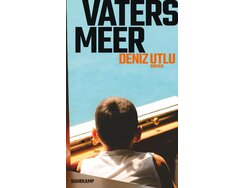
A novel about memory and migration set between Germany and Turkey, Father’s Sea is a gentle and moving portrait of a family...
A novel about memory and migration set between Germany and Turkey, Father’s Sea is a gentle and moving portrait of a family within the framework of a father–son relationship. Even as it explores political and social issues specific to its dual setting, this is a novel that focuses on the human aspect and as such will have broad appeal.
First-person narrator Yunus grows up as an only child in Hanover but visits Turkey with his parents every summer. He is thirteen when his father, Zeki, has two strokes that leave him almost entirely paralysed – unable to speak or move beyond blinking, he has “locked-in syndrome”. Zeki is looked after in a care home before being transferred back to the family house, where Yunus’ mother cares for him until his death ten years later.
Thematically engaged with memory, Father’s Sea is structured as Yunus’ attempts to retrace his father’s life and remember the man he was before he became paralysed. Like the titular sea, his memories flow into one another, with a few distinct moments standing out for their emotional significance. In a reflection of memory’s non-linear nature, Utlu makes large chronological leaps; however, these are interwoven skilfully so as never to interrupt the narrative. From start to finish, we see how Yunus develops from a self-centred teenager to a thoughtful young man, struggling to hold on to his father and re-evaluate what he knows of the past.
Other family members and friends play more of a supporting role – even Yunus’ mother, Senem, is a comparatively minor figure in the novel. This close perspective allows us to see how Yunus slowly changes, and also allows Utlu to explore related themes such as masculinity, identity and belonging. While Zeki’s condition is very specific, the experience of coming to terms with a close relative’s serious medical diagnosis is one that will sadly be familiar to many readers, lending the novel emotional weight and relatability.
Unflinching when it comes to complex emotions and the effect that profound loss can have on a life, Father’s Sea is a melancholic yet compelling work that demonstrates Utlu’s great skill as a storyteller.
- Publisher:
- Topic:
- Fiction
- ISBN:
- 978-3-518-43144-3
- Author:
- Deniz Utlu
- Pages:
- 384
- Price:
- € 25.00
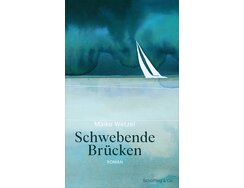
Floating Bridges is a work of auto-fiction, recounting the sudden death of Maike Wetzel’s husband in a boating accident. The narrative...
Floating Bridges is a work of auto-fiction, recounting the sudden death of Maike Wetzel’s husband in a boating accident. The narrative is raw and authentic, as the author navigates the depths of love, grief, and motherhood, while offering an intimate, intense portrait of her marriage.
The novel begins with the narrator seated on a picnic blanket beside a lake with her two children aged one-and-a-half and seven. It is a vibrant summer day, and her husband, accompanied by his brother, sets off on a trip across the lake on his small sailing boat. Wetzel’s husband was given the boat by his family and friends as a fiftieth birthday present. On the fateful day in June 2018, he encounters strong winds that lead the vessel to capsize. It is the couple’s seven-year-old son who raises the alarm. Despite his attempts to swim back to shore, the husband tragically drowns. His brother is rescued.
Written in concise chapters, the narrative focus alternates between the harrowing incident on the lake and its aftermath, while also exploring earlier years when the couple meet and start a family. The reader learns about the sequence of events during the accident via excerpts from newspaper reports.
Floating Bridges depicts the narrator’s journey in coping with her husband’s death. There are many poignant moments, such as the funeral, the process of clearing out his belongings, visiting the bank to make changes to their joint account, group therapy sessions, and interactions with kindergarten teachers and other parents during children’s birthday parties. Throughout these experiences, the narrator’s emotions oscillate between private grief and her composed public façade.
Wetzel writes in a sensitive and nuanced manner that enables her to skilfully paint vivid pictures and craft immersive atmospheres. As an author, she delves deep into the thoughts and emotions of her characters, authentically conveying their inner thoughts, which allows the reader to empathise with the protagonists.
The novel carries a profound emotional weight, evoking a sense of deep sadness while gracefully avoiding any trace of self-pity or despair. As the narrative unfolds, a comforting resolution emerges, offering solace to both the author and the reader. Wetzel’s linguistic precision is striking, as is her raw honesty. The content is relevant and written in the tradition of Joan Didion, Joyce Carol Oates, and Ocean Vuong.
- Publisher:
- Topic:
- Fiction
- ISBN:
- 978-3-89561-288-6
- Author:
- Maike Wetzel
- Pages:
- 208
- Price:
- € 22.00

After a century of underserved obscurity, Maria Lazar’s work is in the process of being rediscovered. Fourtimes ME is a story of...
After a century of underserved obscurity, Maria Lazar’s work is in the process of being rediscovered. Fourtimes ME is a story of female friendship and betrayal, as well as an account of the societal challenges faced by women during the 1920s.
Lazar’s work is a valuable addition to the European modernist canon, alongside contemporaries such as Ilse Aichinger and Irmgard Keun. This novel is reminiscent of Virginia Woolf both for its stream-of-consciousness narrative and for its feminist politics, and Lazar’s witticisms and dark humour evoke Anita Loos and Dorothy Parker.
Fourtimes ME offers fascinating insights into women’s lives during the rapidly changing Weimar era. The narrator is the youngest daughter of a banker’s family of four in an unnamed European city after World War I. The narrator often feels invisible, and her identity is so porous she sometimes does not recognise herself in the mirror. She experiences the world through her three on/off friends: pale, pretty Grete, sharp, athletic Ulla, and alluring, lower-class Anette.
In an attempt to define herself, the narrator starts to write. She first confesses to minor betrayals of the women in her life, before working up to her more significant, final betrayal when she embarks on an affair with Grete’s husband Axel, while Grete is giving birth to their first child. This sets the stage for the novel’s exploration of (the limits of) women’s solidarity in a world that – despite the Weimar era’s new possibilities – is still ruled by men.
When the narrator becomes pregnant, Ulla helps to arrange a hospital abortion. The narrator takes an overdose of opiates but is saved by Anette. After Grete dies miscarrying her second child, the narrator collapses and is kicked out of her home for not paying rent. She decides to marry Axel, but this is anything but a happy ending: she already knows he will not be faithful and any daughter they may have will suffer under the same patriarchy.
The novel’s four women suffer individually, as well as collectively, from the patriarchal structures that define their lives. Fourtimes ME draws a sharp picture of the distinct characters and circumstances of the four women, while the novel’s recursive structure matches the narrator’s increasing despair and her occasional flits into other women’s consciousness have a powerfully disorienting effect. With its frank discussion of taboos, including abortion, menstruation, masturbation, sexual abuse, sex work, STIs, and lesbian sex, this is an eye-opening, feminist view on the Weimar era.
Leben verboten! was another New Books in German recommendation by Maria Lazar and was Ö1 Book of the Month (Juli 2020), Österreichbestseller.
- Publisher:
- Topic:
- Fiction
- ISBN:
- 978-3-903244-26-9
- Author:
- Maria Lazar
- Pages:
- 220
- Price:
- € 24.00
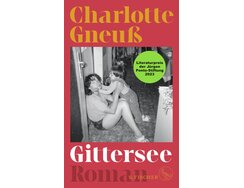
Charlotte Gneuß’s literary thriller is set in the former East Germany, in the Dresden suburb of Gittersee – a gripping...
Charlotte Gneuß’s literary thriller is set in the former East Germany, in the Dresden suburb of Gittersee – a gripping debut from a new talent on the German literary scene.
The novel tells the story of sixteen-year-old Karin Köhler’s recruitment as a Stasi informer, following the defection of her boyfriend to the West. Gneuß brings to life an oppressive regime while showing that the people who lived under it still had agency. The book explores Karin’s life as a rebellious teenager with more than her fair share of adult responsibility.
Two teenage friends, Rühle and Paul, attempt to flee to the West, but their journey ends in disaster as Paul lies motionless next to his motorbike. Karin, Paul’s girlfriend, lives with her grandmother, parents, and little sister, and is visited that night by two Stasi officers, Wickwalz and Hamm. She is taken to the police station to give a statement. Through flashbacks we learn how Karin saw Paul stashing money in his motorbike before leaving for Czechoslovakia, where he said he was going to a festival. Karin was supposed to join the boys but at the last minute she was held back by her conscience: she is her sister’s main carer and feels she cannot leave the little girl.
Karin’s only confidante is her school friend, Marie. Marie parrots the Party line about capitalism, but Karin is less convinced. Wickwalz recruits Karin to find out what happened to Paul. As time goes on, Karin is increasingly attached to Wickwalz, confiding in him about the breakdown of her parents’ marriage and her father’s drinking. Karin becomes embroiled in a confusing web of misleading information about Paul’s whereabouts.
Karin sees Rühle again; he says he is being followed by the Stasi and that he has something to tell her. As he opens up to her, Karin starts to wonder whether he and Marie are also working for the Stasi. Karin tries to stop him talking because she knows she will have to repeat it all to Wickwalz. Unsure who she can trust, she has to navigate tense situations in which her double life threatens to unravel. Events are revealed gradually, and sometimes revised in flashback, as if Karin doesn’t know whether to trust the reader with the whole truth.
The tension and lack of trust between the characters is thrillingly developed throughout Gittersee and combines with Gneuß’s sparkling prose to make for a breathtaking read.
- Publisher:
- Topic:
- Fiction
- ISBN:
- 978-3-10-397088-3
- Author:
- Charlotte Gneuß
- Pages:
- 240
- Price:
- € 22.00
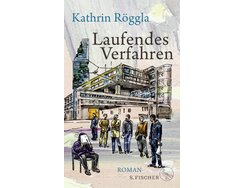
Winner of the prestigious Heinrich Böll Prize and longlisted for the German Book Prize, Laufendes Verfahren is a significant new novel from...
Winner of the prestigious Heinrich Böll Prize and longlisted for the German Book Prize, Laufendes Verfahren is a significant new novel from Austrian author Kathrin Röggla. Acclaimed for her unflinching interrogations of socio-political themes, she here uses a distinctive narrative perspective to examine democracy and justice in the context of the NSU trial, an event that has gone largely unexplored in contemporary literature.
Running from May 2013 to July 2018, the National Socialist Underground trial was one of the longest and most expensive court cases in German history. Not only did it result in the imprisonment of Beate Zschäpe and four helpers for the racially motivated murders of ten people, it also highlighted institutionalised racism in the German police force, which had ruled out Neo-Nazis as suspects in the investigation and instead focused on those with Turkish backgrounds. Many of the victims’ families and members of the public were critical of the trial for not going far enough, a line that Röggla deftly explores in this intelligent literary novel.
Steering clear of melodrama but written instead in cool, sharp prose, Laufendes Verfahren focuses entirely on the court proceedings as seen by a first-person-plural narrator. This unusual perspective assumes some prior knowledge on the reader’s part, but allows us to become one with the “we” watching the trial from the public gallery. We thus sit alongside a vivid cast of characters, including a political blogger, an anti-fascist grandmother, a woman from the Turkish embassy, the courtroom “grandpa” and more. Short, vignette-like sections lay out the different phases of the trial, from witness statements to concluding remarks, in a condensed narrative that takes on a more lyrical, philosophical tone as proceedings draw to a close.
As the title suggests, Röggla is concerned not just with the trial itself but its impact on Germany at the time of its conclusion and beyond. Refusing to sensationalise the NSU, she concentrates on the trial’s ramifications and the meaning of “we” – what ingrained racism does to a society, and how that same society can function as an overseer of justice and democracy. Raising critical questions about political and personal responsibility, the role of our courts and the very real spectre of Neo-Nazism, Laufendes Verfahren is a challenging, considered novel in which every word counts.
- Publisher:
- Topic:
- Fiction
- ISBN:
- 978-3-10-397155-2
- Author:
- Kathrin Röggla
- Pages:
- 208
- Price:
- € 24.00

Swiss author Sarah Elena Müller’s nuanced debut, Picture without Girl, tackles the subject of child abuse from an unusual and...
Swiss author Sarah Elena Müller’s nuanced debut, Picture without Girl, tackles the subject of child abuse from an unusual and thought-provoking perspective. Written in spare prose that implies more than it tells, the novel blends references to myth and superstition with a modern, cinematic treatment. A multi-disciplinary artist who has already received numerous awards, Müller proves herself an original and noteworthy talent.
In five distinct sections, Picture without Girl follows a young protagonist growing up in rural Switzerland. The unnamed girl is fascinated by television and moving images, but her left-leaning parents, a sculptor and environmental scientist, have a deep distrust of the media and are wrapped up in their own worlds. Unable to express herself, the child seeks refuge at the house of her neighbours, Ege and Gisela. Ege is a technology addict, equally cut off from the real world, while Gisela lives largely upstairs and is often away travelling. Ege allows the child to watch as much television as she wishes and invites her to participate in the films he makes.
Here, darker undertones creep into the novel: child abuse is strongly implied yet never made explicit. Müller’s unemotional language and shifting narrative perspectives draw the reader into the story but keep us in a state of uncertainty, reliant solely on our suspicions. Combined with the main characters’ inability to communicate, and their roles as outsiders in a small Swiss village, this cleverly underscore how easy it can be not to act on misgivings, how perpetrators can bend reality to suit their own stories, and how intervention often comes too late or not at all.
Caught between the literal darkness of Ege’s home and her parents’ insufficient attempts to bond with her, the child barely speaks and begins to wet the bed. Her parents turn to a healer for help, while the child herself begins to communicate with the picture of an angel she finds in a book – the figure comes alive in her mind and allows her to have a voice. Emphasising their alienation from each other, none of the characters aside from Ege and Gisela are named, existing merely as social or familial roles (father, child, neighbour, and so on).
Spanning several decades, from the 1960s to the recent past, Picture without Girl tackles other complex issues including climate change, the conflict between agriculture and the environment, and the responsibility of individuals in society. Provocative and engaging, asking more questions than it answers, Müller’s debut is a fresh and compelling novel worthy of much discussion.
- Publisher:
- Topic:
- Fiction
- ISBN:
- 978-3-03926-051-5
- Author:
- Sarah Elena Müller
- Pages:
- 208
- Price:
- € 30.00

The latest novel by German Book Prize winner Eugen Ruge, Pompeji is an ambitious work of historical fiction that reflects contemporary issues....
The latest novel by German Book Prize winner Eugen Ruge, Pompeji is an ambitious work of historical fiction that reflects contemporary issues. Holding great appeal for politically engaged readers as well as those interested in classical history, Pompeji is an engaging tale that employs vivid characterisation, a pacey narrative and clever humour to draw us into a fictionalised world.
Narrated from the perspective of Josse, a working-class citizen of Pompeii, the novel begins just after the earthquake of AD 62 that largely destroyed the city. One of its knock-on effects is to interrupt Josse’s schooling; he instead spends several years hanging around the ruins and reinventing himself as a member of the Pannonian aristocracy. Josse and his friends unwittingly end up at a meeting of philosophical groups banned by Emperor Titus, where one of the members announces that the nearby Monte Somma is a volcano. Convinced of the danger, Josse makes a halting speech – the first of five around which the novel is structured – recommending that everyone leave Pompeii.
Though Josse’s first speech is hesitant, his talent for rhetoric improves when he joins a community of philosophers and free thinkers founding a new town further down the coast. The place is known as The Window on the Sea and attracts a number of outsiders. During this period, Josse also makes the acquaintance of Polybius, a Pompeiian businessman who encourages him to overthrow the new community’s leader – which provides the occasion for another speech. Shortly afterwards, Josse falls under the seductive spell of Livia, the wife of Pompeii’s governor, who is keen to avoid a mass exodus to the new town for personal financial reasons.
Consulting Pliny and Pythagoras – whose back stories are presented in digressions from the main narrative – Josse discovers that Monte Somma is not in fact a volcano, and accordingly urges the citizens of Pompeii to stay. He then stands for election as city governor and is delivering his fifth and final speech of the novel when Vesuvius erupts and destroys everything in sight.
Rhetoric is a major theme of Pompeii, with Josse’s speeches increasing in skill and scope as the novel progresses. Ruge reflects present-day concerns around rhetoric and fake news; Josse’s personal reinvention, political machinations and willingness to bend the truth also speak to the power-grabbing often seen in the real world. Other themes include democracy, military might, class systems and colonialism – as much as Pompeii is a multicultural city, it is also portrayed as a colony of Rome. The historical context is bolstered by the inclusion of real classical figures, while Ruge’s idiomatic language and richly textured narrative give Pompeii broad appeal.
- Publisher:
- Topic:
- Fiction
- ISBN:
- 978-3-423-28332-8
- Author:
- Eugen Ruge
- Pages:
- 368
- Price:
- € 25.00
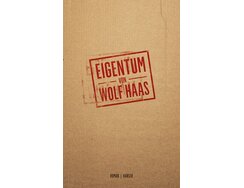
Prizewinning crime novelist Wolf Haas shares memories of his upbringing in rural Austria and of the days immediately before his...
Prizewinning crime novelist Wolf Haas shares memories of his upbringing in rural Austria and of the days immediately before his mother’s death in this luminous family narrative.
Haas’s intimate account of his family’s story is also the history of a country – even a world – between the wars and in their aftermath. He writes movingly of ordinary people’s struggle to survive and make the best of things in the challenging circumstances in which they find themselves. Haas offers a relatable and accessible glimpse of an enduringly fascinating period, sharing valuable insights into a century we are still trying to understand.
Born in 1923, a time of economic depression and inflation, in a remote area of rural Austria, Haas’s mother’s lifetime ambition is to own her own home. Growing up between the two world wars, her life is far from easy, and is characterised by an ongoing struggle to belong. She is given away to a farmer at the age of ten, because her parents cannot afford to feed all their children. During World War II she is part of the female workforce, and afterwards she works in the hospitality industry in Switzerland, sending her earnings home to support her family in Austria.
Haas’s mother’s death, at the age of ninety-four, is the starting point for the narrative. Flashbacks are used to good effect, shifting back and forth between Haas’s mother’s account of her life and Haas recounting what he can remember of the stories she told. The anticipation of her death is interwoven with a history spanning World War II and jumps seamlessly between the past and the present. The stories are not told chronologically but are linked to the last conversations and memories his mother shares with him.
Property is a story of displacement, poverty, and daily life during the turbulent twentieth century. Haas’s mother’s life is focused on building a family home, and, when she is pregnant with Haas’s older brother, she moves into the house she helped to build. This is where she brings up her sons and lives for the rest of her life. Despite finally having a place to live, the fear of not belonging and of being forced to leave always remains with her.
Property is a keenly observed work of autofiction, full of wit and humorous wordplay. Haas’s distinctive literary style, so beloved by readers of his crime fiction, shines through in this appealing novel, and can be tracked full circle back to his upbringing.
- Publisher:
- Topic:
- Fiction
- ISBN:
- 978-3-446-27833-2
- Author:
- Wolf Haas
- Pages:
- 160
- Price:
- € 22.00
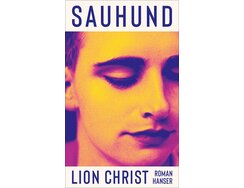
Sly Dog is an accomplished debut, recounting the coming-of-age story of a young, gay man in 1980s Munich. ...
Sly Dog is an accomplished debut, recounting the coming-of-age story of a young, gay man in 1980s Munich.
Flori moves from his small Bavarian hometown to the city and immerses himself in Munich’s gay scene. The novel explores how he navigates the expectations of others, balancing complicated friendships and family ties, alongside a looming fear of the AIDS epidemic.
The novel opens as Flori is doing community service at a care home in his hometown. The woman he looks after there, encourages him to perform and dress up in women’s clothes at the department store where he works. Flori gets together with local boy Gregor, driving in Gregor’s car to secret spots in the woods where they mess around together on the back seat. Flori longs to have a glamorous life and to work on the stage. Eventually he is sacked from the department store for stealing, and escapes to the city in search of the glamour he craves. At first, he stays with his childhood friend Theresa, but Flori’s hedonistic lifestyle in Munich’s gay clubs is at odds with Theresa’s hardworking nine-to-five existence. Flori feels alienated and oppressed, letting Theresa down again and again until finally she kicks him out.
As the AIDS epidemic spirals, Flori starts performing sex acts for money. Consumed by self-loathing, he resolves to end his life in the river, but is picked up by Miguel, a drag queen who lives with his partner, Armin. They take Flori in, and he lives with them for two years in a semblance of family life. Miguel teaches Flori to make up his face and style his hair, and Flori discovers a new version of himself, whom he no longer hates. He gets a job at the bar where Miguel performs and eventually his own apartment. He also makes amends with his mum, who is furious that she has not heard from him in years. Later, he meets Jakob and the pair of them fall in love. The novel ends with Jakob terminally ill, and Flori on the cusp of running away as he has done all his life, but instead deciding to return home and take care of his lover until the end.
Sly Dog is a highly relatable novel, showcasing the claustrophobia of growing up ‘different’ in a small town; the pressure from all sides to conform; and the impulse to break free and carve out one’s own path. Despite his often-questionable and self-destructive behaviour, it is impossible not to be on Flori’s side.
- Publisher:
- Topic:
- Fiction
- ISBN:
- 978-3-446-27747-2
- Author:
- Lion Christ
- Pages:
- 364
- Price:
- € 24.00
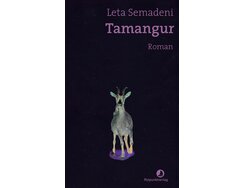
160pages – 978-3-85869-956-5 – 24,00€...
160pages – 978-3-85869-956-5 – 24,00€
Set in an Alpine village, Tamangur depicts the grief experienced by a young child and her grandmother following the deaths of the child’s brother and grandfather. With its creative imagery and spare prose, Leta Semadeni’s novel explores the intersection between the childlike and the surreal.
A young child lives with her grandmother in a small Alpine village. Both characters remain unnamed as we experience their lives through short, sparsely told yet striking episodes. The child’s grandfather has gone away to the hunters’ paradise of Tamangur. As the book continues, we meet the village’s other inhabitants through the child’s eyes. There is the wildly entertaining Elsa and her ne’er-do-well boyfriend, Elvis Presley; the village tailor, who steals other people’s memories and repeats them as her own; and the beloved grandfather, whom the grandmother and child are both mourning.
The scenes in the present are interspersed with flashbacks as well as the child’s dreams, in which she is often faced with the horrifying moment of losing her little brother to the river, which carries him away towards the Black Sea. The vignettes provide a sense both of village life and the reality behind the disturbing images: the grandmother’s grief, and her anger that her beloved husband should leave her, even in death; and the young girl’s guilt that she was responsible for her brother’s death when he drowned in the river. The novel portrays the competing emotions of grief and guilt within the family, counterbalancing them with the warmth of the love between grandmother and grandchild.
At the end of the book the grandmother is lying in a hospital bed and her granddaughter is now a young woman. The grandmother declares that her ‘soul is still young,’ and shortly thereafter goes to Tamangur, by which we understand that she dies. The final scene lays bare the metaphor of the novel’s title, while emphasising the importance of imagination for the child in dealing with her grief.
Tamangur is a hugely rewarding novel, remarkable for its evocative setting, crisp prose, and whimsical, unsettling imagery, perfectly poised between the comic and the tragic.
- Publisher:
- Topic:
- Fiction
- ISBN:
- 978-3-85869-956-5
- Author:
- Leta Semadeni
- Pages:
- 160
- Price:
- € 24.00 £ 0.00

The second part of a loose trilogy entitled ‘Biography of a Woman’, Das Liebespaar des Jahrhunderts stands alone as an autobiographical novel...
The second part of a loose trilogy entitled ‘Biography of a Woman’, Das Liebespaar des Jahrhunderts stands alone as an autobiographical novel chronicling the end of a thirty-year relationship. In the same cool, unfussy prose displayed in its predecessor, Das Vorkommnis, this first-person narrative is a carefully crafted exploration of the mundane details that constitute daily life as a couple, set against the backdrop of socio-political changes in East Germany. Julia Schoch’s astute observations and characteristic lightness of touch conspire to create an extremely readable novel that will appeal to fans of Annie Ernaux.
Opening with an attention-grabbing statement, ‘I’m leaving you’, Das Liebespaar des Jahrhunderts is narrated by an unnamed woman addressing her partner of thirty years. They have two children – about whom most details are omitted – yet, after half a lifetime together, the narrator is dissatisfied and planning to end their relationship. Her partner, we sense, may see things differently, though we only have access to his thoughts in what the narrator is able to observe of his reactions. Schoch’s decision to write from such an intimate first-person perspective and to focus on the small details of life, rather than milestone events, gives Das Liebespaar des Jahrhunderts a timeless quality and ensures it will be universally relatable.
Looking back over three decades, from youthful infatuation to the challenges of bringing up children, maintaining a home, falling out of love and gradually establishing a peaceful yet humdrum co-existence, the narrator sets her relationship’s highs and lows within the context of East Germany’s ideological collapse and rebuilding. This mirroring effect adds historical and social weight to the novel; it gives rise to questions about where world events and personal experience intersect, the values and ideals we pass on to our children, and how something as “ordinary” as a relationship can outlast governments, revolutions, even entire political regimes.
A tribute to love even as it chronicles its end, Das Liebespaar des Jahrhunderts also draws attention to the process of writing in an autofictional style that is very of-the-minute. Further themes include the overlap between memory and fiction, the human need to attach significance to our experiences, and the weariness so many people feel at the rapid changes taking place in the world. Quiet yet memorable, laced with gentle humour and displaying great care in its use of language, Julia Schoch’s compact novel is a wise and touching meditation on relationships.
- Publisher:
- Topic:
- Fiction
- ISBN:
- 978-3-423-28333-5
- Author:
- Julia Schoch
- Pages:
- 192
- Price:
- € 22.00
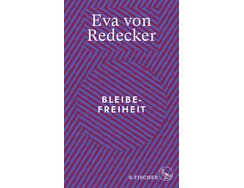
Eva von Redecker’s philosophical essay argues for the need to rethink the concept of freedom in view of the climate...
Eva von Redecker’s philosophical essay argues for the need to rethink the concept of freedom in view of the climate crisis. Her work is a fresh and engaging thought experiment at the intersection of philosophy, natural sciences, and environmentalism.
Von Redecker argues that rather than conceiving of freedom as a mainly spatial concept – freedom to roam, to do whatever we want whenever and wherever – we should include a temporal element in its reconception. Freedom thus becomes the freedom to stay, to live in the moment, to spend time in a meaningful way, both with other human beings and in/with nature. This rethinking gives us the capacity to reduce or even reverse the impact modernisation has had on the planet over the last two hundred years.
Von Redecker’s book will appeal to readers of philosophy as well as to readers interested in manifestos and treatises on political economy, such as Simon Sharpe’s Five Times Faster: Rethinking the Science, Economics, and Diplomacy of Climate Change, Eric Holthaus’s The Future Earth, and the numerous books on degrowth that have appeared in the last few years. Rather than providing practical solutions for alleviating the climate crisis, this personal philosophical essay aims to raise questions and prompt the reader to explore new ways of thinking.
The essay is divided into three parts: wealth of time, fulfilled time, and time of abundance. The word play models the systematic shift that von Redecker advocates: from a traditional concept of freedom focusing on the individual’s right to move freely in geographical space and based on the modern, capitalist view of history as linear progression and accumulation of riches, to a concept of freedom that sees us voluntarily staying put more often, living in the moment and being part of a community. The idea of ‘freedom to stay’ prioritises the well-being of the environment and future generations ahead of our own desires to travel and accumulate wealth.
Freedom to Stay combines autobiographical elements (von Redecker’s upbringing on an eco-farm, her father’s year-long battle with cancer, her interactions with loved ones that affect her thinking) with a tour de force account of Western philosophy, economics, and the natural sciences. Von Redecker draws on a wide range of sources, from Plato via Hobbes and Hutton to contemporary feminist thinkers such as Luisa Muraro. This is a truly interdisciplinary essay that pulls together highly disparate strands of thought in an engaging and thought-provoking manner.
- Publisher:
- Topic:
- Non-fiction
- ISBN:
- 978-3-10-397499-7
- Author:
- Eva von Redecker
- Pages:
- 160
- Price:
- € 22.00

A thoughtfully crafted counterpoint to two well-known literary tropes, Warum wir noch hier sind is an anti-thriller, anti-Berlin novel about life in...
A thoughtfully crafted counterpoint to two well-known literary tropes, Warum wir noch hier sind is an anti-thriller, anti-Berlin novel about life in the wake of unimaginable trauma. Defiantly literary with a distinctly satirical undertone, it focuses on the human impact of violent crime rather than clever detective work.
In the wake of her fourteen-year-old daughter Etty’s random murder just a few paces from her own front door, Heide must work out how to go on living. Narrated from the perspective of her closest friend, Warum wir noch hier sind adopts a fragmented structure and economical prose that seems influenced by Pelny’s background as a poet and singer-songwriter. Moving away from a conventional linear timeline, it instead reflects life as we live it: a collection of vivid impressions, thoughts and experiences that sometimes overlap, repeat or otherwise refuse to conform to a neat narrative pattern.
Between bouts of looking after Heide, mourning Etty and trying to keep herself afloat in a perilous freelance role (as a casting assistant for the reality TV show The Farmer Wants a Wife), the narrator has a close relationship with her grandmother, who lives now in sheltered housing. As a blood relative, the grandmother stands in marked contrast to most other characters in the novel, who together constitute Heide’s “elected family” of friends and neighbours. This choice of cast – mainly female friends who love one another fiercely – is another way in which Pelny subverts traditional narratives while reflecting how many people live today.
Despite the fact that it hinges on a murder, this light-on-plot novel is concerned with emotions rather than events, about what and whom we choose to value, and how to piece a life back together when it has been ripped apart by violence and grief. It also asks a series of universally pertinent questions about what society and governments are – or are not – doing to ensure women’s safety, especially in cities and after dark.
Pelny presents Berlin – a perennially popular setting – in an unglorified yet authentic light, depicting the city’s darker sides without glamorising the grit. Warum wir noch hier sind is a refreshing, moving and provocative take on established genres that gives a voice to those who often go unheard.
- Publisher:
- Topic:
- Fiction
- ISBN:
- 978-3-7099-8197-9
- Author:
- Marlen Pelny
- Pages:
- 224
- Price:
- € 19.90

Regarded as the most important work by Austrian-Jewish journalist Klara Blum, Der Hirte und die Weberin is a moving love story and...
Regarded as the most important work by Austrian-Jewish journalist Klara Blum, Der Hirte und die Weberin is a moving love story and testament to one woman’s extraordinary life. Newly rediscovered some fifty years after the author’s death, this autobiographical novel is stylistically varied, an account of a continent-spanning romance that offers insights into the twentieth-century politics and cultures of Europe, the Soviet Union and China.
Der Hirte und die Weberin opens in Shanghai in 1929. Tschang Nju-Lang, a social activist and theatre director, is unhappy in his marriage and increasingly disillusioned with the social inequalities and repression he perceives in China. In search of a new perspective, he sets out for Europe, travelling to Paris and Moscow. There he meets Hanna, a Jewish writer, and the two fall passionately in love.
After three months, Nju-Lang disappears, leaving Hanna at a loss as to his whereabouts. The narrative perspective – which often switches and includes a section written in the form of diary entries – now takes up Hanna’s story as she tries to locate her lover. A cryptic phone call leads her to suspect that he has been called back to China to work as a communist secret agent, and after the war she duly travels there. Despite the fact that she is alone in a foreign country, facing prejudice, hostility and numerous other challenges, Hanna persists in trying to find the man she loves. This mission takes her on an incredible journey, introduces her to Nju-Lang’s family and, after eleven long years, she finally tracks him down. The lovers are reunited for one night only. The next day, they have to separate, knowing that their commitment to the communist cause means they are unlikely ever to meet again.
Der Hirte und die Weberin closely mirrors Klara Blum’s own story – a dedicated communist, she fell in love with Chinese author and director Zhu Rangcheng on a visit to Moscow in 1937. When Zhu disappeared, Blum travelled to China to find him; she never succeeded but remained there until her death. The fictionalised meeting between Hanna and Nju-Lang is based on the Chinese fairy tale that gives the novel its title: the shepherd and the weaver are two constellations that love one another but can meet just once a year, when birds form a bridge across the night sky.
At times highly stylised, Blum’s prose reflects the alienation both protagonists feel when they visit countries vastly different to their own. Themes of feminism and conflict between the personal and political further add to the novel’s universal quality. With its engaging historical context and strong autobiographical elements, Der Hirte und die Weberin is a truly unique work of fiction.
- Publisher:
- Topic:
- Fiction
- ISBN:
- 978-3-8477-0463-8
- Author:
- Klara Blum
- Pages:
- 309
- Price:
- € 48.00
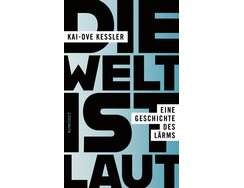
Wide-ranging and informative, Die Welt ist laut is a timely study of noise throughout the history of the world. As well as...
Wide-ranging and informative, Die Welt ist laut is a timely study of noise throughout the history of the world. As well as exploring the various sources of noise – both natural and manmade – and charting how these have changed over time, Kessler examines humanity’s ongoing attempts to measure noise and manage its impacts on our health and well-being. International in scope yet with a distinctly European flavour, this is an original book that can be used as a reference text as well as appealing to general interest.
Die Welt ist laut employs a clear chronological structure, moving from ancient history to the present day. Kessler’s scope is ambitious as he explores what creates noise, taking in everything from the whine of a mosquito to the eruption of Krakatoa, the rattling of mill wheels to the explosion of bombs in modern warfare. Particularly since the industrial revolution and the introduction of motor vehicles, humans have sought to investigate and curb the effects of noise pollution – a subject that Kessler engages with in detail and that has particular relevance given the rapid pace of urbanisation today.
Drawing primarily on the examples of London and New York City, Die Welt ist laut is a relatable work that contains many fascinating insights into human history. In looking to the past, Kessler often turns to famous German figures, such as Schopenhauer and Heine, whose observations on the rising levels of urban noise are proof that this is not a purely modern phenomenon. With most sound now produced by humans, not nature, will the lessons we have learned throughout the past millennia help us to manage noise levels effectively in the future?
Building on many years of research, Die Welt ist laut is a fascinating work of non-fiction that showcases Kessler’s talent as a journalist and background in music. Offering a wealth of facts and interesting perspectives, it is a timely and engaging read that is sure to stimulate discussion.
- Publisher:
- Topic:
- Non-fiction
- ISBN:
- 978-3-498-00354-8
- Author:
- Kai-Ove Kessler
- Pages:
- 432
- Price:
- € 26.00
